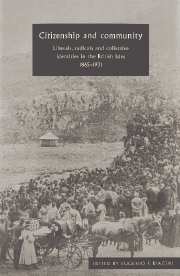 Citizenship and Community
Citizenship and Community Book contents
- Frontmatter
- Contents
- List of contributors
- Acknowledgements
- Introduction: Citizenship, liberty and community
- Part I Citizenship, populism and liberalism
- 1 Liberalism and direct democracy: John Stuart Mill and the model of ancient Athens
- 2 The limits of liberalism: Liberals and women's suffrage, 1867–1914
- 3 Women, liberalism and citizenship, 1918–1930
- 4 Democracy and popular religion: Moody and Sankey's mission to Britain, 1873–1875
- 5 Disestablishment and democracy, c. 1840–1930
- Part II Economic democracy and the ‘moral economy’ of free trade
- Part III Democracy, organicism and the challenge of nationalism
- Part IV Consciousness and society: the ‘peculiarities of the British’?
- Index
5 - Disestablishment and democracy, c. 1840–1930
Published online by Cambridge University Press: 16 September 2009
- Frontmatter
- Contents
- List of contributors
- Acknowledgements
- Introduction: Citizenship, liberty and community
- Part I Citizenship, populism and liberalism
- 1 Liberalism and direct democracy: John Stuart Mill and the model of ancient Athens
- 2 The limits of liberalism: Liberals and women's suffrage, 1867–1914
- 3 Women, liberalism and citizenship, 1918–1930
- 4 Democracy and popular religion: Moody and Sankey's mission to Britain, 1873–1875
- 5 Disestablishment and democracy, c. 1840–1930
- Part II Economic democracy and the ‘moral economy’ of free trade
- Part III Democracy, organicism and the challenge of nationalism
- Part IV Consciousness and society: the ‘peculiarities of the British’?
- Index
Summary
The questions of disestablishment of religion and of spiritual independence from the state do not necessarily coincide, but both have been important features of the movement towards democratic freedom in the United Kingdom. As agents of democracy they have accompanied electoral reform, constitutional change, nationalism and legal freedom of action for trade unions. These different questions overlapped with each other. For example, the desire for voluntary, non-established religion or spiritual freedom depended on franchise extension for its more effective expression in politics and its greater hope of realisation. This connection helped to bear out Max Weber's contention that non-established denominations made a special contribution to the evolution of democracy.
In the 1860s Richard Masheder, a Fellow of a Cambridge college, was fearful that steps towards democracy, such as had been urged in the ‘People's Charter’, would directly encourage disestablishment. He wrote: ‘It is by annual Parliaments, equal electoral districts, and “a reasonable remuneration to members of Parliament”, that Dissent calculates upon reaching the goal proposed – the separation of Church and State’. Churchmen who wished to uphold their established status should therefore defend the existing constitution as eagerly as they championed the church establishment. He proceeded to depict the dangers which he thought would follow disestablishment:
I believe that the downfall of the aristocracy and monarchy will follow close upon the downfall of the Established Church … we will suppose that the dust of the Established Church is given to the four winds of heaven … about ad 2000. Well, soon after that event, I doubt not, an agitation would be commenced against the aristocracy and monarchy.
- Type
- Chapter
- Information
- Citizenship and CommunityLiberals, Radicals and Collective Identities in the British Isles, 1865–1931, pp. 120 - 148Publisher: Cambridge University PressPrint publication year: 1996
- 18
- Cited by


